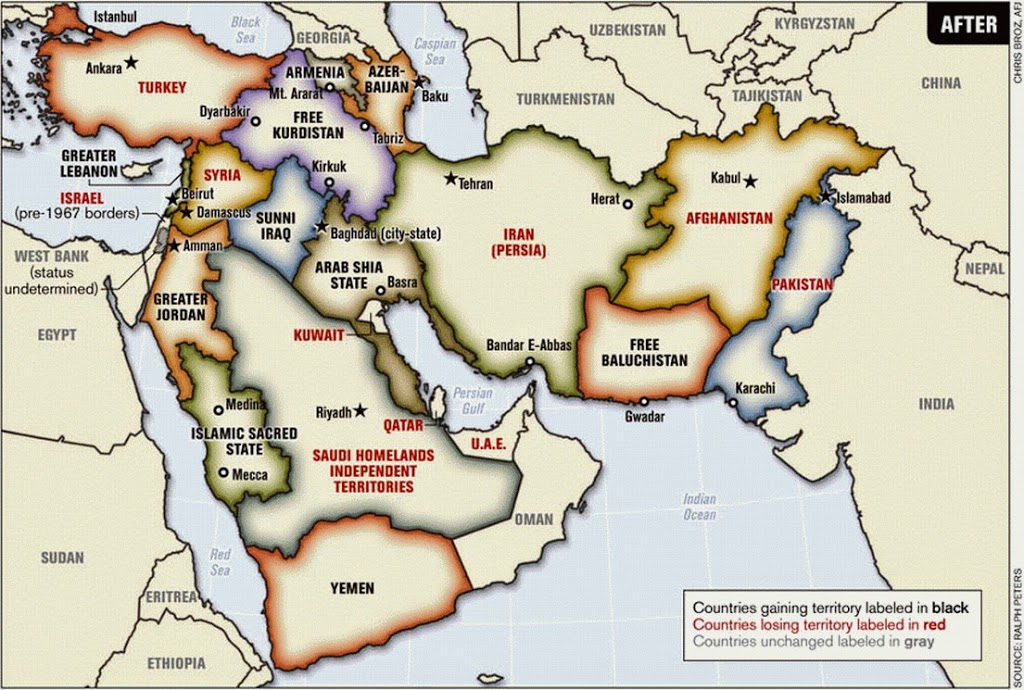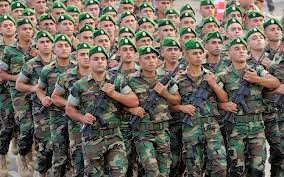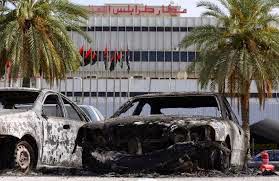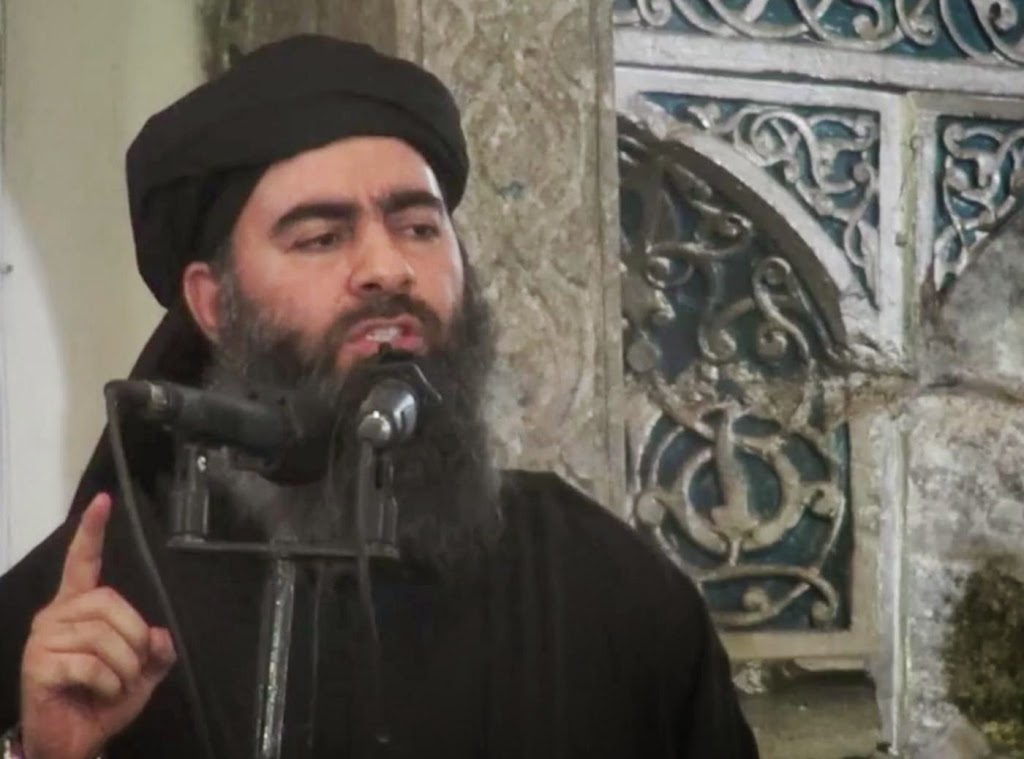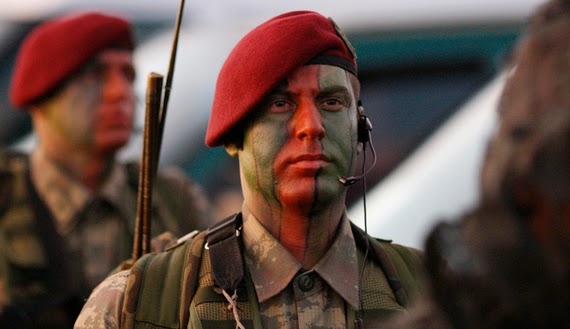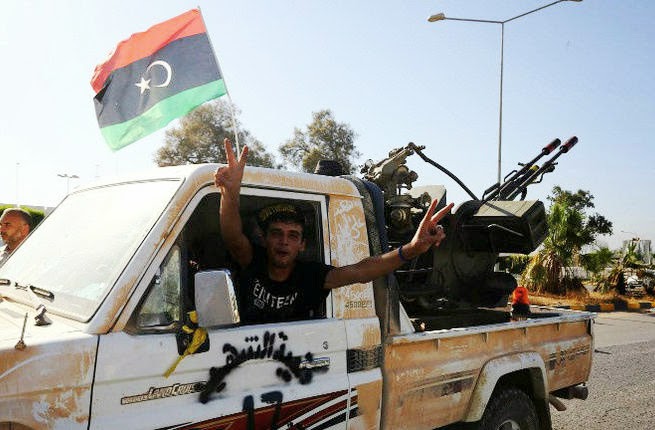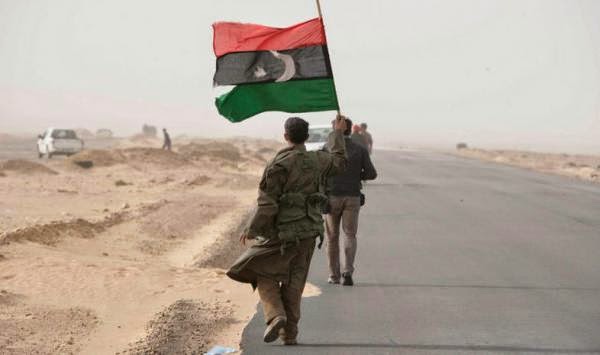Extremists thriving after collapse of order: failure of governments to provide security is empowering warlords across the region
Il Medio Oriente sta scivolando verso un’era dominata dai “signori della guerra”, con gli stati-nazione che lottano in continuazione per controllare tutto il loro territorio, e milioni di inermi cittadini che vivono sotto il dominio dei nuovi capi locali e dei movimenti estremisti…
Armed irregular forces hold effective power over growing areas of Iraq, Syria, Yemen and Libya where central government authority barely reaches. Motivated by religious ideology or regional separatism, they have grabbed oil facilities and weapons, imposed taxes or changed school curriculums, and fought each other as well as traditional armies.
Lebanon, with friends like these, who needs enemies?
In multi-factional states in particular, stable institutions are the best guarantee of a secure nation. Anyone who looks into the history of Lebanon since 1943 cannot fail to notice that whenever the army was safe and cohesive, so was Lebanon itself.
At this juncture, I feel I must mention Fouad Chehab, the Lebanese president from 1958 to 1964, perfectly personified this fact throughout his military and later political career. Chehab, frequently regarded as “the Father of the Army,” and near-unanimously considered Lebanon’s greatest president, was no ordinary politician.
So it is a pity that the ignorant gangs and thugs, who took to the streets last week “in defence of the army” as a reaction against a critical post on Twitter by an Arab TV anchor, know nothing about Chehab’s legacy, his role, his beliefs about the importance of institutions, or his absolute belief in the unity of Lebanon and how to keep it safe and secure.
Those ignorant gangs and thugs did not realize that the army, as well as other national institutions, do not need loud slogans, empty boasts, demagogic tweets, but rather wise citizens who are aware of what threatens the existence of these institutions and undermine its neutrality. The army, the police, or the judiciary must not be closer to one Lebanese faction than another, and no faction should ever claim it “loves” the army more than others.
Excessive ‘love’
Indeed, the Lebanese have experienced such excessive “love” for the army and Lebanon at the onset of the Lebanese War during the 1970s. The result was the collapse and fragmentation of the army, and Lebanon’s very existence as a state imperiled during a civil and regional war that lasted for more than 15 years.
The Lebanese have experienced such excessive “love” for the army and Lebanon at the onset of the Lebanese War during the 1970s
Eyad Abu Shakra
I remember well what happened to the Lebanese army then, and who was working to break it up as a path to dividing and subjugating the country. I also remember how the army lost its cohesion and national support when one Lebanese faction claimed that it alone “loved” and supported it to the exclusion of other factions. Eventually, all Lebanese paid a heavy price for pushing the army into confrontations in the absence of national consensus.
Chehab, who had no children of his own, regarded the army as his child. He cared for it, and knew how dangerous it would be for it to become a vehicle for the whims of politicians. He also profoundly understood, upon taking over as president in 1958 during the height of the Cold War, how dangerous the repercussions of the Cold War, regional tensions, and international rivalry, were; thus he was keen to keep both the country and the army away from the conflicts that were boiling around Lebanon.
Chehab hailed from a princely Sunni Muslim clan that claims descent from the Quraish, Prophet Mohammed’s (peace be upon him) own tribe. However, the branch he was born into had converted to Maronite Christianity during the 18th and 19th centuries. This background helped make him a moderate who rejected religious bigotry, and a strong believer in a Lebanon devoid of sectarian privileges and discrimination. Furthermore, his military upbringing and career ensured his strong commitment to state institutions, which he believed were more important and more permanent than any traditional leadership.
Modern state of Lebanon
True to form, it was Chehab who was the real founder of the modern state of Lebanon through his far reaching reforms of the civil service, the treasury, and the judiciary. His contemporaries fondly recall his trade-mark quote “let’s see what the book says”—alluding to the constitution—whenever ministers and parliamentarians disagreed on political and legislative issues.
Thus, he was a real statesman, not a street bully or a populist charlatan who makes a habit of covering up his mistakes by deluding his followers and selling them out. He believed to the end that the army’s role was to defend the country as a whole, empowered by a national mandate, and not hired or mortgaged or used in internal conflicts. His unshakable conviction was that the national army must be above all parties.
Following the Arab defeat in the 1967 war, however, the prestige of the Arab political system suffered a near fatal blow, while what was then called the “peoples’ liberation war” gained credibility, led by the armed Palestinian movement, the Fedayeen. In Lebanon, the ascendancy of the Fedayeen led to resentment and a counter-reaction among the Christian community.
As a result of the Muslims’ whole-hearted support of the Palestinian fighters, the failure of Lebanon’s leaders to prevent polarization, and Israel’s exploitation of the situation, the Lebanese Army fought the Fedayeen in 1973. This was a bleak precursor that destroyed the army’s reputation for impartiality, and within only two years—in 1975—disaster struck and the Lebanese War erupted.
During this war Chehab’s army disintegrated, splitting into different forces: the Sunni and Shi’ite-dominated Lebanese Arab Army, the Christian 8th Brigade, the Druze 11th Brigade, and the Israeli-supported South Lebanon Army with Saad Haddad, and later Antoine Lahad, as its nominal commanders.
This state of affairs continued until the war officially ended with the signing of the Taif Agreement, an accord which was, in fact, opposed by the most influential players in the Lebanese arena today.
These players are now preventing the election of a new president, and calling for military and intelligence cooperation with the Assad regime along the border with Syria. We should remember that it is these same players who helped erase the borders between Syria and Lebanon a couple of years ago, when they sent armed militiamen into Syria to fight against the anti-Assad rebels. Today, they are trying to use the Lebanese Army as a cover in their fight against the Syrian rebels—as well as extremist groups—who have crossed the now-defunct border and into Lebanon.
Surprise situation
Such a situation should not have come as a surprise, given the exposure of the former Lebanese government’s policy of “distancing” the country from the Syrian conflict as a fallacy.
The Lebanese troops now held hostage by the extremist groups the international community is fighting are indeed the sons of all of Lebanon. They are innocent of any kind of political allegiance, and were not consulted before they were sent to the front-lines at Arsal.
On the other side, those who thought they could control the rules of military engagement in both Syria and Lebanon must be held responsible, more so since there were already some worrying signs.
The killing of the Sunni cleric Sheikh Ahmad Abdul-Wahed weakened the great respect the Lebanese army had enjoyed in Akkar (in north Lebanon), and area nicknamed “the army’s human reservoir,” from which came the largest number of the army’s martyrs during the Nahr al-Bared battle in 2007. This was followed last year in southern Lebanon where the movement of another Sunni cleric, Sheikh Ahmad al-Assir, was destroyed, amid reports that fighters from Hezbollah fought alongside army regulars.
Now the army finds itself in a bloody, sectarian quagmire. This is a catastrophic scenario for the army built by Fouad Chehab, and upon examining the record of those who are now expressing their “love,” and are thus gambling with the army’s future, one should really worry.
Among those people is a man with a longstanding and burning ambition to be president, and who, years ago, left his troops defenseless and ran away to seek refuge in the French embassy in Beirut after a quixotic battle with Syrian troops, a battle that ended with Damascus re-imposing its influence over Lebanon.
Another is a faction that views the Lebanese army, as well as all state security bodies, as mere auxiliaries to a de facto “resistance” movement that receives its orders from overseas.
May God protect the Lebanese Army from its false friends, as it is more than capable of dealing with its enemies.
Source: Asharq al-Awsat
Dozens of Libyan troops killed in Benghazi attacks, clashes
Dozens of soldiers were killed and more than 70 wounded in car bomb attacks and clashes between troops and Islamists around Benghazi airport, a Libyan army spokesman said on Friday, as the UN threatened sanctions.
How to win the ideological war against ISIS
There has been a surge in voices critical of the coalition air strikes against the terrorist group known as the Islamic State in Iraq and Syria (ISIS). Indeed, some critics have voiced concerns over the likelihood of accidently targeting civilians whilst others have refuted the whole idea, arguing that the war against ISIS shouldn’t be physical but ideological.
Such arguments are too simplistic and contribute nothing except turning a blind eye to the realities on the ground.
Of course, any innocent life lost is certainly a life too many and coalition forces should undergo every effort possible to avoid civilian casualties. However, we should not forget that if anyone is guilty of murdering civilians, raping women and terrorizing children it certainly would be ISIS, not the coalition forces.
We should never forget that we are facing a terrorist group that takes pride in slaughtering journalists and humanitarian workers in front of TV cameras so that the whole world can watch.
Not taking action against the likes of ISIS would certainly equate to a crime against humanity, global stability as well as a crime against any hope of bringing peace, moderation and prosperity to the Middle East
Faisal J. Abbas
Speaking of ideology, we should also remember that we are NOT facing a group of peace-loving monks who are advocating love and harmony but rather a bunch of hateful thugs who are using tanks, missile launchers and bombs to invade cities and establish an extremist state where they can – in the name of religion – crown themselves as caliphs and emirs, increase their own wealth, consolidate power and take as many women as they desire as sex slaves.
Frankly, not taking action against the likes of ISIS would certainly equate to a crime against humanity, global stability as well as a crime against any hope of bringing peace, moderation and prosperity to the Middle East.
A war in parallel
As such, I really don’t see how anyone could argue against bombing ISIS’s military capabilities, as this would certainly lessen this group’s ability to continue doing harm and gaining more ground and resources. After all, we should not fool ourselves into believing that these power-hungry criminals would voluntarily denounce violence (and all they gain/achieve through it), just because someone asks them to do so nicely!
On the other hand, nobody is arguing that this war can only be won by military means, obviously an ideological battle should be waged in parallel to discredit and hinder ISIS’s upper hand in spreading their propaganda. I say this regretfully, but there is no question that this terrorist group has proven quite effective in using new platforms such as social media to spread their evil ideas, recruit followers and post awful videos depicting their cruelty.
The key question here is: how do we achieve this? The answer probably lies in a multi-layered, combined and coordinated effort of local, regional and international thought leaders, media outlets and religious figures.
To fully defeat ISIS, we must also deal with the climate which enabled them to exist
Faisal J. Abbas
Equally as important is having a serious discussion with the major social media outlets about their content guidelines. I, for one, can’t understand why there is a universal consensus when it comes to what is defined as pornographic material, which most social media outlets ban and penalize users for sharing, but there is no consensus on what is considered terrorist propaganda. One only has to skim through Twitter feeds or Facebook pages of ISIS-like groups or members to see pictures of decapitation and outright calls for committing crimes. This simply can no longer be tolerated and a solution must be found as soon as possible before further harm is done.
Now, what we should also remember is that to fully defeat ISIS, we must also deal with the climate which enabled them to exist, as Toby Dodges agues in a recent article in the latest issue of the International Institute for Strategic Studies’ (IISS) Survival: Global Politics and Strategy argues.
According to the IISS expert, the defeat of ISIS in Iraq should be followed by the resolution of the political issues that created the space in which this group has thrived. He added that ISIS’s seizure of Mosul in June and its swift advance across a wide swathe of Iraqi territory was a direct result of contemporary flaws within the political system set up after the 2003 regime change.
The same for Syria
Similarly, one could argue the same for Syria. For if it wasn’t for the international community’s failure to deal with the Assad regime’s massacres – which has resulted in over 150,000 deaths and nearly two million refugees since 2011 – ISIS wouldn’t have become the monster it is today. Of course, the Assad regime helped and benefited from the creation of this monster in its bid to position itself as the only viable, secular and safe solution in Syria.
However, as pointed out in a recent article by Al Arabiya’s General Manager Abdulrahman al-Rashed, there seems to be positive signs that the world has finally come to realize that both the problem and solution lie in Damascus. In a column published on this website, he stresses on the importance of a strong central government that takes on the mission of fighting these terrorist groups for the coming years. “It’s impossible to build a strong central government without toppling Assad first. However, this will not work without the consent of his allies, Iran and Russia,” he adds.
To conclude, critics of the coalition may see military action as a threat and think that it will only intensify the problem. However, such critics seem to be ignoring that it was the inaction towards the atrocities in Syria and the failed state in Iraq that resulted in the swelling of ISIS’s ranks from a few hundred to nearly 30,000 according to the latest estimates.
If we were to be hopeful, on the contrary, we could see the coalition’s efforts as a golden opportunity to rid the region of extremism, terrorism and injustice once and for all. However, for this to be achieved, it should include both Sunni and Shiite terrorists and put an end to the tyranny of Bashar al-Assad so that faith is restored in the world order and no young Muslim will ever again be fooled into believing that justice can be achieved via the likes of ISIS.
Source: alarabiya.net
Libya violence ‘threatens Tunisia stability’
The violence has displaced about one out of every five Libyans into Tunisia — 1.5 million people — straining the country’s already in crisis economy, according to Mr Hamdi. Islamist militants and arms flow over Libya’s porous border with Tunisia. At the same time, the proxy battle between regional powers supporting the competing groups in Libya has fuelled polarisation on all sides of the political divide in Tunisia.
Mr Hamdi said Tunisia maintains relations with all sides in the conflict because “the Libyan problem will remain with us for many years and we don’t want to lose our credibility”. Coordinating a strategy with Egypt, which supports pro-government forces, is especially important, he added. “We both face the same challenge and we both need to talk to each other, consult — we have to trust each other.”
Three years of transition in Tunisia was marred by Islamist violence, assassinations of leftist leaders and unrest as the government failed to even begin to fix the deep-rooted economic pathologies that helped spark the Arab Spring.
The competing political factions were able to craft a widely praised constitution and the Islamist Ennahda party, which had dominated the previous election, agreed to cede power to a caretaker government amid the unrest. But the distrust and polarisation between the parties and within Tunisian society remains, and the dynamics in Libya and elsewhere in the region could make the pragmatic political compromises of Tunisia’s recent past more difficult to recreate after parliamentary elections later this month and a first round of presidential polls in November.
“In the Arab countries whoever wins thinks he has a green light to do whatever he wants,” Mr Hamdi said, speaking on the sidelines of the UN General Assembly. “But power has to be shared inclusively, if they don’t want problems. Even if a big party wins, that party must involve other parties in power-sharing.”
Ennahda is expected to win the most seats in the upcoming parliamentary elections. The party has said it will not put forward a presidential candidate.
Key question are the nature of the unity government it will seek to form and what economic policies are likely to follow, said William Lawrence, director for Middle East and North Africa at the Center for the Study of Islam and Democracy.
Under the first Ennahda government, Tunisia was given $1.5 billion by Qatar, a period that also saw relations sour with the UAE and Saudi Arabia, Gulf Arab countries that oppose Islamist groups.
But since the interim government was formed, Doha has not given new funds and Mr Hamdi said he has undertaken efforts to rebuild relations with all GCC countries, with a focus on attracting Gulf investors to Tunisia.
“Our policy is to have excellent and strategic relations with all Gulf countries, this is extremely important,” Mr Hamdi said. He has visited the GCC several times in the past eight months, he said, and will be making a trip to Abu Dhabi after the Eid holiday.
Are Turkish troops trapped at Syrian tomb?
Libya militia group rejects UN ceasefire
Si avvicina sempre di più un intervento armato in Libia… Uno dei gruppi di miliziani più importanti in Libia (Libya Dawn o Fajr Libya) ha respinto un invito delle Nazioni Unite per il cessate il fuoco immediato, chiedendo invece il disarmo degli altri gruppi rivali.
“L’unico modo per porre fine al conflitto in Libia è quello di disarmare i nostri gruppi rivali e arrestare i loro capi“ si legge nella dichiarazione rilasciata da Fajr Libia, che è stata pubblicata ieri sulla pagina Facebook del gruppo.
The stance of Libya Dawn, which is in control of the capital city of Tripoli, comes a day after representatives from warring groups in Libya held ceasefire talks mediated by Bernardino Leon, the United Nations special representative and head of the UN Support Mission in Libya.
Though Leon described ceasefire negotiations as “positive” and “constructive,” the future of the talks remains unclear as the specter of a full-fledged civil war looms large over the violence-stricken country.
Libya has plunged into chaos following the 2011 uprising that toppled the longtime ruler, Muammar Gaddafi. The ouster of Gaddafi gave rise to a patchwork of heavily-armed militias and deep political divisions.
The North African country has recently been witnessing numerous clashes between government forces and rival militia groups that refuse to lay down arms. The groups are now turning their guns on each other in an attempt to dominate politics and the country’s vast oil resources.
Earlier this month, Leon had warned that rapidly deteriorating security and deepening political divisions have brought Libya “closer to the brink of protracted conflict and civil strife.”
Source: albawaba.com
Islamic State and Nusra Front move toward alliance amid coalition strikes in Syria
Lo Stato Islamico sta tessendo un’alleanza con il Fronte Al-Nusra, il più grande affiliato di Al-Qaeda in Siria, contro una coalizione (guidata dagli Stati Uniti) che prosegue i bombardamenti contro le posizioni jihadiste.
Jabhat al-Nusra ha dovuto affrontare una crescente pressione dai propri membri per riconciliarsi con il suo rivale Stato Islamico e formare un fronte unito contro gli attacchi aerei, iniziati in Siria la scorsa settimana.
Joining forces with IS would require Nusra Front members to pledge loyalty to the group, which has declared a caliphate in territory it controls in those countries. This would effectively put an end to the Nusra Front, fighters in the group say.
Long one of the most effective forces fighting Syrian President Bashar Assad, Nusra Front was weakened this year by battles with Islamic State, an Al-Qaida splinter group that routinely employs ruthless methods such as beheadings and mass executions. The two share the same ideology and rigid Islamic beliefs, but fell out during a power struggle that pitted IS head Abu Bakr al-Baghdadi against Al-Qaida chief Ayman al-Zawahri and Nusra Front leader Abu Mohammed al-Golani.
But the U.S.-led air and missile strikes, which have hit Nusra Front as well as Islamic State bases in Syria, have angered many Nusra members who say the West and its allies have joined forces in a “crusader” campaign against Islam.
According to a report in The Guardian, Nusra Front units in north Syria have made peace with the Islamic State, and a senior source told the newspaper that leaders of both groups are holding war planning meetings, although they have yet to formally join forces.
Sources close to Islamic State told Reuters that some Nusra fighters were joining them after the strikes and there was a growing sense among many that it was time to put their differences aside.
Others think a formal merger is unlikely. “There are hardline voices inside Nusra who are pushing for reconciliation with Islamic State,” a source close to Nusra’s leadership said, though he doubted it would happen. “I know Golani. He would never reconcile with Islamic State. If he ever does it, it would be in a direct order from the leadership, and that is al-Zawahri himself.”
However, one Islamic State fighter said he believed there was an “80 percent chance that the brothers of Nusra will join the State.”
The Syrian Observatory for Human Rights, a Britain-based monitoring group, said on Friday over 200 fighters had joined Islamic State in the northern Aleppo area, many from the Nusra Front, since U.S. President Barack Obama said he was prepared to strike the group in Syria.
In an audio message posted on militant forums on Thursday, a senior Al-Qaida figure warned Muslims against joining Islamic State and called on fighters in Syria to “rescue the ship of jihad, and reach it before it deviates from its course.”
The message from Muhammad bin Mahmoud Rabie al Bahtiyti told fighters in Syria to avoid infighting and fanaticism, the SITE monitoring service said.
No trust
Even before the air strikes, Nusra Front was losing fighters to Islamic State, which is seen as more organized and determined to impose Islamic rule.
“This goes without saying, this is a crusader war that includes all infidel nations against the Islamic State,” said Nusra Front commander Abu Mussab al-Makdessi in a voice message posted in jihadi forums online in response to a question from an Islamist about the group’s reaction to the strikes.
“Regardless of what happened between us, they remain our brothers, and the ideological bond between us is stronger than anything. We are ready to fight by their side … our blood is their blood.”
One former Nusra fighter inside Syria said the air strikes had strengthened Islamic State’s position even further. “Nusra is in a very difficult situation. I think now it should just announce the end of itself. Zawahri has to be brave,” he told Reuters. “It is no longer like the old days. He needs to understand this. This is a new era with a caliph,” he said.
Source: Haaretz
Intervento in Siria-Iraq: un precedente per la Libia?
All’Assemblea delle Nazioni Unite tenutasi a New York nei giorni scorsi, gran parte dell’attenzione negli interventi dei capi di governo che si sono alternati sul palco è stata dedicata alla minaccia jihadista e all’intervento internazionale contro lo Stato Islamico (IS).
Ma lo stato islamico non costituisce l’unica minaccia presente nell’area. In Libia, negli ultimi mesi, gran parte del territorio della Cirenaica, l’est del paese, è caduto sotto il controllo di formazioni dichiaratamente jihadiste, in particolare di Ansar al-Sharia.
Parte della comunità internazionale si sta chiedendo quindi se l’intervento contro IS non possa costituire un precedente per intervenire militarmente in Libia.
Il paese vive ormai una situazione di anarchia: fazioni di varia astrazione controllano il territorio; le milizie di Misurata, legate alla Fratellanza musulmana, e quelle di Zintan, vicine al partito più secolarista di Mahmud Jibril, continuano a fronteggiarsi in Tripolitania; un generale rinnegato Khalifa Haftar cerca di riprendere il controllo dell’area di Bengasi; il nuovo parlamento eletto nelle ultime elezioni di giugno, e riconosciuto come legittimo dalla comunità internazionale, si è rifugiato a Tobruk, quasi sotto protezione egiziana, mentre le forze islamiste hanno riconvocato il vecchio parlamento a Tripoli, minacciando il pieno controllo della Banca centrale e dei ministeri.
Si sta creando un consenso politico internazionale sulla Libia?
- « Previous Page
- 1
- …
- 246
- 247
- 248
- 249
- 250
- …
- 268
- Next Page »
